By November of 2019, the three largest airlines in the world (American, Delta and United) will all have variably-priced award flights in one form or another. Frequent flyers lament them, but for most travellers, it’s good news.
If you are considering booking travel or signing up for a new credit card please click here. Both support LiveAndLetsFly.com.
If you haven’t followed us on Facebook or Instagram, add us today.
Countering My Own Analysis, Kind Of
Five months ago, I wrote that variably-priced (or dynamically-priced) award charts hurt loyal but infrequent travellers. This post seems to counter my previous analysis but there are two reasons why it’s not a total u-turn. Award charts help loyal but infrequent travellers (ex. passengers that always fly United but only fly twice annually) plan for award trips. That’s still true. Second, infrequent flyers typically have lower account balances thus less likely to be able to absorb higher prices when awards increase without notice. That’s also still true.
Now for a complete u-turn.
Variably-Priced Awards vs. Fixed Price Award Chart
Traditionally, airline frequent flyer programs established an award chart with fixed rates for routes usually based on distance or regions (North America to Europe, Intra-European flights.) Fixed price awards allow consumers to plan better but are susceptible to limited availability.
Variably-priced awards aren’t directly tied to revenue costs for a flight rather to availability. Those two aren’t the same but often act similarly. Unlike awards with Southwest and JetBlue which are directly tied to the cash cost of a seat, variably-priced awards still seem to hold onto price buckets. For example, Delta might price awards to Europe on emptier flights at 20,000 points roundtrip, whereas Southwest may charge 5,637 points for a one-way to Florida from the Northeast.
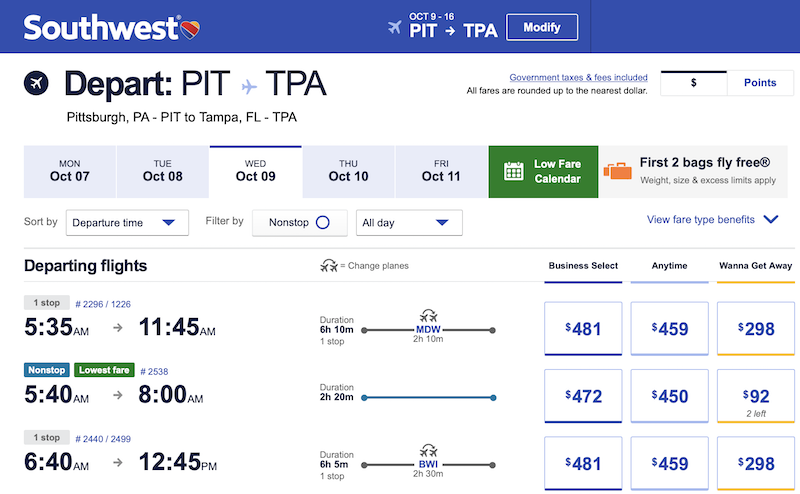
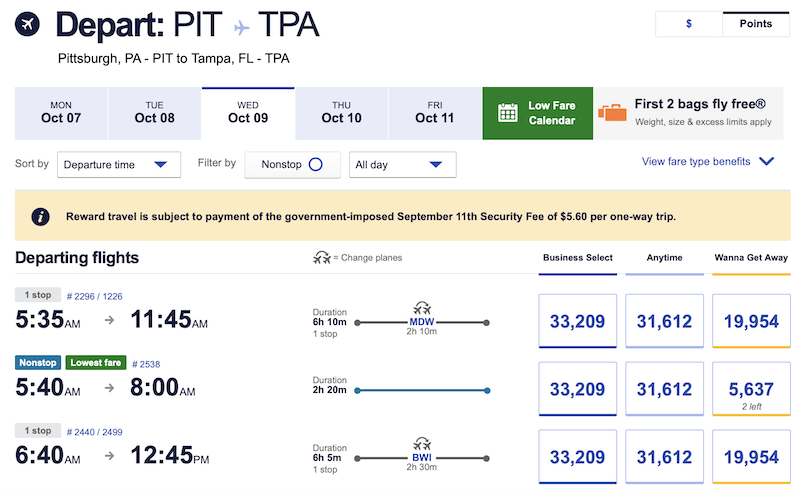
Who Benefits From Variably-Priced Awards?
Those who typically fly coach awards and have smaller balances benefit the most. In the past, there was a term “orphaned miles” which described miles that didn’t fit into a mileage balance you were collecting and would be left without a home. For example, assume you took a random flight on Alaska Airlines but otherwise haven’t built a balance large enough to redeem for a one-way award flight, that balance of miles would be orphaned.
With smaller balances, airlines have made those airlines more useful than in the past. An underlying worry to my previous post was that prices would become untenable for many travellers who aren’t on the road accruing hundreds of thousands every year. In a credit to Delta, they have offered a lot of value
Why Frequent Flyers Hate Them
Frequent Flyers have larger balances and generally, know the system better. They routinely find outsized value for premium cabin seats on long haul flights. An award to Cape Town from New York City can cost as little as 102,000 miles roundtrip with ANA. The same route in cash I priced randomly for $3,680-$5,344.
Airplanes have fewer business and first class seats, opportunities for outsized value is diminished with variably-priced awards.
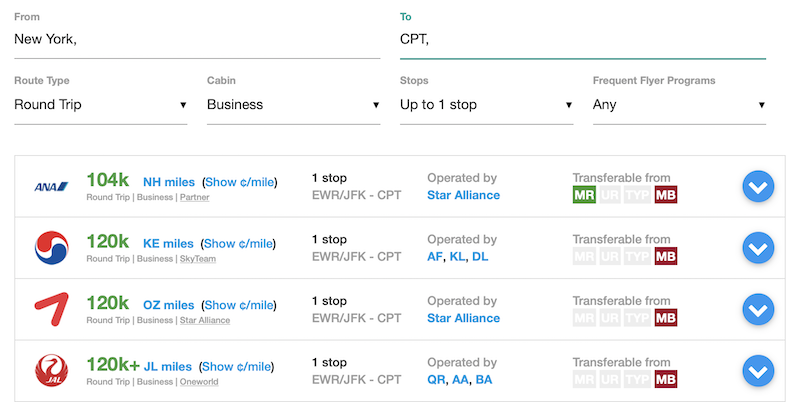
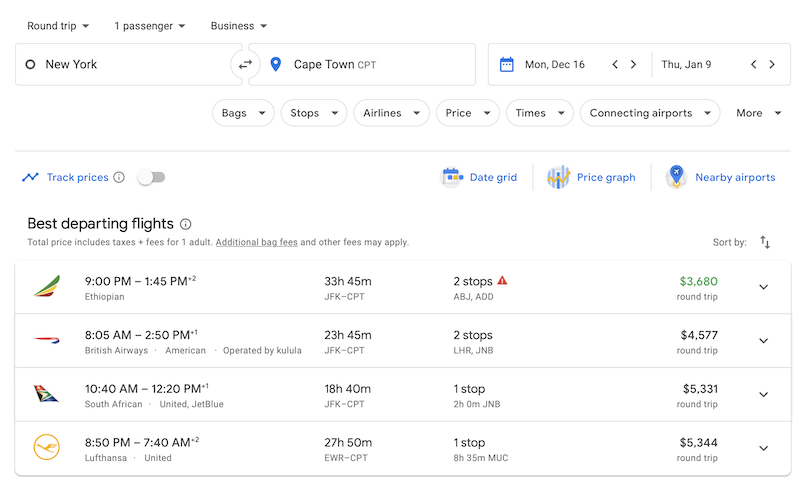
Why Do Variably-Priced Awards Benefit Most Travellers?
The vast majority of awards that are redeemed are coach awards. Every year the Wall Street Journal highlights the best programs with which to redeem miles. Every year, Southwest wins. Why? Because as long as the flight is not completely sold out, they offer a seat in coach (though there is no saver level and they only offer coach so it’s flawed.)
American Airlines (who variably prices awards by but within an award chart) and other carriers report their redemption levels and how many of those seats were offered at saver level. American has made more available at saver level for coach awards, but not business class long haul seats. However, as those are less often redeemed, it’s absolutely true that more travellers benefit from both an increase in seats available and the lower available prices of those seats.
Conclusion
Delta has offered flights at 18,000-30,000 miles to Europe roundtrip during their weekly award sales with suprising consistency. Maybe that’s down to Delta being on their best behavior. But American, who I have otherwise lambasted for their award behavior has made good on offering discount prices for awards on short routes and have improved availability. As much as I personally fail to benefit from dynamically-priced coach awards, most travellers do and that’s good news for flyers.
What do you think? Are variably-priced awards generally better for most consumers? Are they a slippery slope toward award costs increases? Would you move to an airline that has fixed award charts?



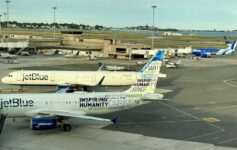
What this change, and other downgrades to status while making status harder to get, is saying is that they do not think rewarding loyalty to the brand is as important as it used to be. When you are selling out flights regardless, that may be economically rational. If that changes and competition gets tougher, though, a lack of loyalty will make recovery harder. Especially if you have a bad brand.
I agree that when the next recession hits, and it will, they will be in serious trouble. The Pareto principle (80% of your business comes from 20% of your customers) will tilt attention back to those elites that they’ve alienated.
When the recession hits the legacy carriers will come running to their once loyal customers promising fields of daisies to run naked through and a plethora of promotions to beg forgiveness. “Oh, we are sorry!! Here’s a nice saver award level for out very beloved customers to thank you for the $1k tickets you pay to Des Moines.” And when the recession is over they will go back to not giving a flying F%!ck and give their free seats to Non-Rev employees before ever selling them at a reasonable mileage to their most “loyal” customers. Not gonna fool me this time around. I’d rather fly Southwest. At least they are honest with their crap.
Check Anywhere in the U.S. to Brazil between now and February in Business or First on AA and tell me if dynamic pricing is working for the passengers who spend the most with American. Further, check with expert flyer on the number of seats available (especially in Business and First).
Even at the last minute (which used to be the saving grace of saver levels for those of us who would play the waiting game) business and first is virtually empty on many flights and they are forcing you into “dynamic” pricing to 150K and more. American is failing themselves AND their best customers. They prefer to upgrade non-revs for nothing rather than offer last minute saver awards to their Exec Plats in a bait to make them spend more miles. Screw it, moving to United where at least they tend to offer more last minute opportunities.
It’s certainly not working for the customers that spend the most. I linked in the post that American Airlines Awards Abide Abysmally and I find that in my own experience too. I moved to United a few years ago but haven’t built enough miles yet to see if the award space is better, but I had enough of American’s flights showing 150k one-way or 110k one-way to Europe with $400 in surcharges on BA while the cabins are clearly empty.
In the end it comes down to what you want to do with your miles. If your happy to use them to grab tickets in Coach over paying cash then these are a great deal for you.
But if your goal is aspirational travel then dynamically prices awards are a major setback. Because the average person who is earning miles on personal spend is going to struggle to accumulate enough miles for those redemptions. Especially when the price is a moving target.
Aspirational travel? For years as an Exec Plat I did just fine booking flights to Brazil to my second home a day or two prior to travel at saver levels. Seats were VERY often released at Saver levels a few days before. In the past 8-12 months they have completely vanished.
What is frustrating is that half the cabins in AA in business and, especially First, are filled with non-revs to Brazil because they go unsold. Fly any flight to GRU and you are surrounded by AA employees in premium cabins, especially in First.
Aspirational? Aspirational is Singapore First in the new suites. A basic last minute First at a saver level on AA to Brazil when the cabin is empty is not being greedy. American is baiting and forcing more miles off people with flights that are half full the day before. If they want to do that with non butt in seat flyers, ok. But for Exec Plats who pay $1000 to fly to Des Moines during the week it’s outrageous.
This is why I will switch to United soon as they are much better with releasing premium cabins a few days out. Well, until they follow suit….as I am sure they will eventually. Then I am pretty much screwed as Alaska on the east coast is not a viable option for me. Which will probably mean I will just fly Southwest domestically and pay for Business on quality Intl carriers…and screw the legacy U.S. airlines
What we need is more competition.
@121 – We agree. I have a lot of friends who signed up for a single card with a single bonus, spent it, and then continued to spend on that card and fly that airline but never accumulate enough for another trip. One in particular signed up for a Delta card (not my recommendation) and doesn’t have enough miles for a roundtrip from Omaha to Pittsburgh, but does have enough to go roundtrip from Minneapolis to Paris. It doesn’t deliver the exact value they want, but for a six-hour drive to the twin cities they can see the city of lights, that’s hard to argue with.
I think I mentioned this in the post, but in case I didn’t, it’s really been down to Delta delivering valuable options instead of just saying they were making “enhancements” they actually kept their part of the bargain.
To state the obvious: this is true for MOST TRAVELERS. It’s almost certainly NOT true for MOST BOARDINGAREA VISITORS.
You’d be surprised. Besides, I find value in AMEX-Delta transfers if it means I can send friends who don’t care about the class of service to Europe for 36,000 points roundtrip combined.
To summarize your argument:
Variable award pricing is good for idiots, those who don’t plan ahead, and the lazy.
For those who know what they’re doing, want to (or need to) actually plan ahead, and/or are willing to put in a little effort, variable award pricing is a disaster.
There’s your article, without all the fluff.
You’re welcome.
@Dick Bupkiss – Thanks for the summary.
Cape Town * not Capetown